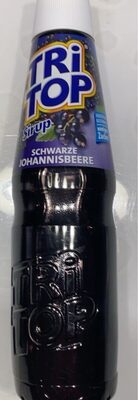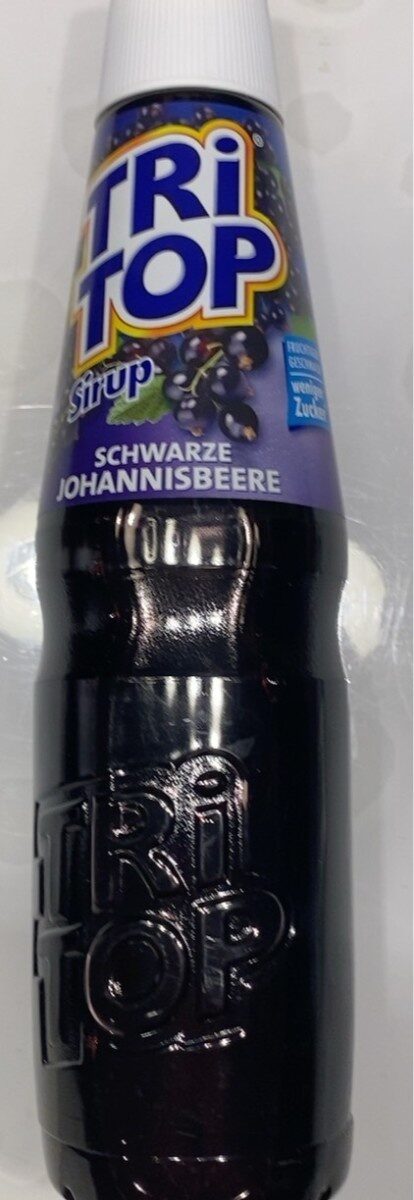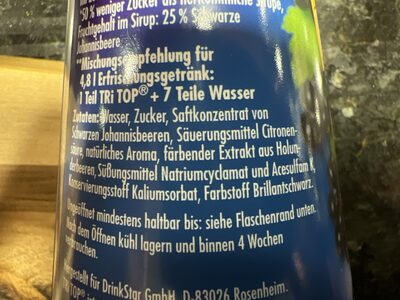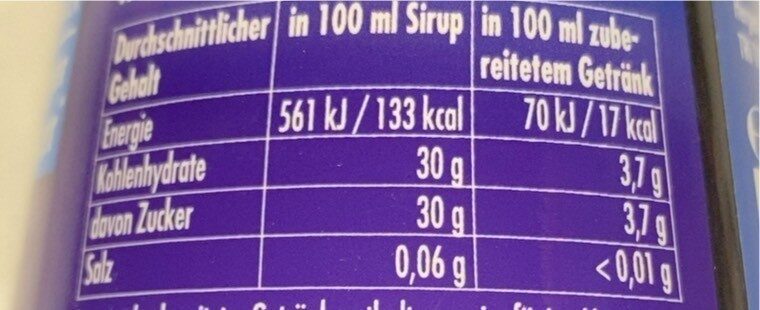Help us make food transparency the norm!
As a non-profit organization, we depend on your donations to continue informing consumers around the world about what they eat.
The food revolution starts with you!
TRI TOP Sirup Schwarze Johannisbeere - 600 ml
TRI TOP Sirup Schwarze Johannisbeere - 600 ml
This product page is not complete. You can help to complete it by editing it and adding more data from the photos we have, or by taking more photos using the app for Android or iPhone/iPad. Thank you!
×
Barcode: 4019313014242 (EAN / EAN-13)
Common name: Getränkesirup mit Schwarze-Johannisbeere-Geschmack
Quantity: 600 ml
Packaging: Plastic, Paper, Pet-polyethylene-terephthalate, Bottle, Transparent-pet, de:Pfandfrei
Brands: Tri Top
Categories: Beverages, Syrups, Flavoured syrups, Blackcurrant syrups
Labels, certifications, awards: Low or no sugar, Low sugar, Reduced sugar
Stores: Kaufland
Countries where sold: Germany
Matching with your preferences
Health
Ingredients
-
16 ingredients
: Wasser, Zucker, 25% Fruchtsaftkonzentrat (Schwarze Johannisbeeresaftkonzentrat), Säuerungsmittel (Citronensäure), Natürliches Aroma, Farbstoff (Holunderbeerenextrakt), Süßungsmittel (Natriumcyclamat, Acesulfam K), Konservierungsstoff (Kaliumsorbat), Farbstoff (Brillantschwarz BN).Allergens: de:1-teil-sirup-mit-7-teilen-wasser-mischen
Food processing
-
Ultra processed foods
Elements that indicate the product is in the 4 - Ultra processed food and drink products group:
- Additive: E151 - Brilliant black bn
- Additive: E950 - Acesulfame k
- Ingredient: Colour
- Ingredient: Flavouring
- Ingredient: Sweetener
- Ingredient: Fruit juice concentrate
Food products are classified into 4 groups according to their degree of processing:
- Unprocessed or minimally processed foods
- Processed culinary ingredients
- Processed foods
- Ultra processed foods
The determination of the group is based on the category of the product and on the ingredients it contains.
Additives
-
E151 - Brilliant black bn
Brilliant Black BN: Brilliant Black BN, Brilliant Black PN, Brilliant Black A, Black PN, Food Black 1, Naphthol Black, C.I. Food Black 1, or C.I. 28440, is a synthetic black diazo dye. It is soluble in water. It usually comes as tetrasodium salt. It has the appearance of solid, fine powder or granules. Calcium and potassium salts are allowed as well. When used as a food dye, its E number is E151. It is used in food decorations and coatings, desserts, sweets, ice cream, mustard, red fruit jams, soft drinks, flavored milk drinks, fish paste, lumpfish caviar and other foods.E151 has been banned in the United States, Belgium, Denmark, Germany, Sweden, Austria, Switzerland, Japan, Finland. It is approved in the European Union. It was banned in Norway until 2001 when it was unbanned due to trade relationships with other countries.It is used for staining animal by-products in category 2.Source: Wikipedia
-
E202 - Potassium sorbate
Potassium sorbate (E202) is a synthetic food preservative commonly used to extend the shelf life of various food products.
It works by inhibiting the growth of molds, yeast, and some bacteria, preventing spoilage. When added to foods, it helps maintain their freshness and quality.
Some studies have shown that when combined with nitrites, potassium sorbate have genotoxic activity in vitro. However, potassium sorbate is generally recognized as safe (GRAS) by regulatory authorities.
-
E330 - Citric acid
Citric acid is a natural organic acid found in citrus fruits such as lemons, oranges, and limes.
It is widely used in the food industry as a flavor enhancer, acidulant, and preservative due to its tart and refreshing taste.
Citric acid is safe for consumption when used in moderation and is considered a generally recognized as safe (GRAS) food additive by regulatory agencies worldwide.
-
E950 - Acesulfame k
Acesulfame potassium: Acesulfame potassium - AY-see-SUL-faym-, also known as acesulfame K -K is the symbol for potassium- or Ace K, is a calorie-free sugar substitute -artificial sweetener- often marketed under the trade names Sunett and Sweet One. In the European Union, it is known under the E number -additive code- E950. It was discovered accidentally in 1967 by German chemist Karl Clauss at Hoechst AG -now Nutrinova-. In chemical structure, acesulfame potassium is the potassium salt of 6-methyl-1‚2,3-oxathiazine-4-3H--one 2‚2-dioxide. It is a white crystalline powder with molecular formula C4H4KNO4S and a molecular weight of 201.24 g/mol.Source: Wikipedia
Ingredients analysis
-
Palm oil free
No ingredients containing palm oil detected
-
Vegan status unknown
Unrecognized ingredients: Fruit juice concentrate
-
Vegetarian status unknown
Unrecognized ingredients: Fruit juice concentrate
-
Details of the analysis of the ingredients
: Wasser, Zucker, Fruchtsaftkonzentrat 25% (Schwarze Johannisbeere), Säuerungsmittel (Citronensäure), Natürliches Aroma, Farbstoff (Holunderbeerenextrakt), Süßungsmittel (Natriumcyclamat, Acesulfam K), Konservierungsstoff (Kaliumsorbat), Farbstoff (Brillantschwarz BN)- Wasser -> en:water - vegan: yes - vegetarian: yes - ciqual_food_code: 18066 - percent_min: 25 - percent_max: 50
- Zucker -> en:sugar - vegan: yes - vegetarian: yes - ciqual_proxy_food_code: 31016 - percent_min: 25 - percent_max: 30
- Fruchtsaftkonzentrat -> en:fruit-juice-concentrate - percent_min: 25 - percent: 25 - percent_max: 25
- Schwarze Johannisbeere -> en:blackcurrant - vegan: yes - vegetarian: yes - ciqual_food_code: 13007 - percent_min: 25 - percent_max: 25
- Säuerungsmittel -> en:acid - percent_min: 0 - percent_max: 25
- Citronensäure -> en:e330 - vegan: yes - vegetarian: yes - percent_min: 0 - percent_max: 25
- Natürliches Aroma -> en:natural-flavouring - vegan: maybe - vegetarian: maybe - percent_min: 0 - percent_max: 5
- Farbstoff -> en:colour - percent_min: 0 - percent_max: 5
- Holunderbeerenextrakt -> en:elderberry-extract - vegan: yes - vegetarian: yes - ciqual_food_code: 13126 - percent_min: 0 - percent_max: 5
- Süßungsmittel -> en:sweetener - percent_min: 0 - percent_max: 5
- Natriumcyclamat -> en:e952 - vegan: yes - vegetarian: yes - percent_min: 0 - percent_max: 5
- Acesulfam K -> en:e950 - vegan: yes - vegetarian: yes - percent_min: 0 - percent_max: 2.5
- Konservierungsstoff -> en:preservative - percent_min: 0 - percent_max: 5
- Kaliumsorbat -> en:e202 - vegan: yes - vegetarian: yes - percent_min: 0 - percent_max: 5
- Farbstoff -> en:colour - percent_min: 0 - percent_max: 5
- Brillantschwarz BN -> en:e151 - vegan: yes - vegetarian: yes - percent_min: 0 - percent_max: 5
Nutrition
-
Poor nutritional quality
⚠ ️Warning: the amounts of fiber and of fruits, vegetables and nuts are not specified, their possible positive contribution to the grade could not be taken into account.This product is considered a beverage for the calculation of the Nutri-Score.
Positive points: 0
- Proteins: 0 / 5 (value: 0, rounded value: 0)
- Fiber: 0 / 5 (value: 0, rounded value: 0)
- Fruits, vegetables, nuts, and colza/walnut/olive oils: 0 / 10 (value: 0, rounded value: 0)
Negative points: 6
- Energy: 3 / 10 (value: 70, rounded value: 70)
- Sugars: 3 / 10 (value: 3.7, rounded value: 3.7)
- Saturated fat: 0 / 10 (value: 0, rounded value: 0)
- Sodium: 0 / 10 (value: 4, rounded value: 4)
The points for proteins are counted because the negative points are less than 11.
Nutritional score: (6 - 0)
Nutri-Score:
-
Nutrient levels
-
Fat in low quantity (0%)
What you need to know- A high consumption of fat, especially saturated fats, can raise cholesterol, which increases the risk of heart diseases.
Recommendation: Limit the consumption of fat and saturated fat- Choose products with lower fat and saturated fat content.
-
Saturated fat in low quantity (0%)
What you need to know- A high consumption of fat, especially saturated fats, can raise cholesterol, which increases the risk of heart diseases.
Recommendation: Limit the consumption of fat and saturated fat- Choose products with lower fat and saturated fat content.
-
Sugars in high quantity (3.7%)
What you need to know- A high consumption of sugar can cause weight gain and tooth decay. It also augments the risk of type 2 diabetes and cardio-vascular diseases.
Recommendation: Limit the consumption of sugar and sugary drinks- Sugary drinks (such as sodas, fruit beverages, and fruit juices and nectars) should be limited as much as possible (no more than 1 glass a day).
- Choose products with lower sugar content and reduce the consumption of products with added sugars.
-
Salt in low quantity (0.01%)
What you need to know- A high consumption of salt (or sodium) can cause raised blood pressure, which can increase the risk of heart disease and stroke.
- Many people who have high blood pressure do not know it, as there are often no symptoms.
- Most people consume too much salt (on average 9 to 12 grams per day), around twice the recommended maximum level of intake.
Recommendation: Limit the consumption of salt and salted food- Reduce the quantity of salt used when cooking, and don't salt again at the table.
- Limit the consumption of salty snacks and choose products with lower salt content.
-
-
Nutrition facts
Nutrition facts As sold
for 100 g / 100 mlPrepared
for 100 g / 100 mlPrepared
per serving (200 ml)Compared to: Blackcurrant syrups Energy 561 kj
(133 kcal)70 kj
(17 kcal)140 kj
(34 kcal)-48% Fat 0 g 0 g 0 g -100% Saturated fat 0 g 0 g 0 g -100% Carbohydrates 30 g 3.7 g 7.4 g -53% Sugars 30 g 3.7 g 7.4 g -52% Fiber ? ? ? Proteins 0 g 0 g 0 g -100% Salt 0.06 g < 0.01 g < 0.02 g +292% Fruits‚ vegetables‚ nuts and rapeseed‚ walnut and olive oils (estimate from ingredients list analysis) 26.25 % ? ?
Environment
-
Eco-Score A - Very low environmental impact
⚠ ️Select a country in order to include the full impact of transportation.The Eco-Score is an experimental score that summarizes the environmental impacts of food products.→ The Eco-Score was initially developped for France and it is being extended to other European countries. The Eco-Score formula is subject to change as it is regularly improved to make it more precise and better suited to each country.Life cycle analysis
-
Average impact of products of the same category: A (Score: 100/100)
Category: Syrup (mint, strawberries flavouredetc.), with sugar diluted in water
Category: Syrup (mint, strawberries flavouredetc.), with sugar diluted in water
- PEF environmental score: 0.02 (the lower the score, the lower the impact)
- including impact on climate change: 0.10 kg CO2 eq/kg of product
Stage Impact Agriculture
53.2 %Processing
7.4 %Packaging
27.4 %Transportation
7.4 %Distribution
3.2 %Consumption
1.4 %
Bonuses and maluses
-
Missing origins of ingredients information
Malus: -5
⚠ ️ The origins of the ingredients of this product are not indicated.
If they are indicated on the packaging, you can modify the product sheet and add them.
If you are the manufacturer of this product, you can send us the information with our free platform for producers.
-
Packaging with a medium impact
Malus: -6
Shape Material Recycling Impact 1 Bottle PET - Transparent Medium 1 Lid Plastic High 1 Label Paper Low
Eco-Score for this product
-
Impact for this product: A (Score: 89/100)
Product: TRI TOP Sirup Schwarze Johannisbeere - 600 ml
Life cycle analysis score: 100
Sum of bonuses and maluses: -11
Final score: 89/100
-
Carbon footprint
-
Equal to driving 0.1 km in a petrol car
10 g CO² per 100g of product
The carbon emission figure comes from ADEME's Agribalyse database, for the category: Syrup (mint, strawberries flavouredetc.), with sugar diluted in water (Source: ADEME Agribalyse Database)
Stage Impact Agriculture
33.0 %Processing
19.9 %Packaging
26.0 %Transportation
18.6 %Distribution
2.2 %Consumption
0.3 %
Packaging
-
Packaging with a medium impact
-
Packaging parts
1 x Bottle 600ml (PET - Transparent)
1 x Lid (Plastic)
1 x Label (Paper)
-
Packaging materials
Material % Packaging weight Packaging weight per 100 g of product Paper or cardboard Plastic Total
-
Transportation
-
Origins of ingredients
Missing origins of ingredients information
⚠ ️ The origins of the ingredients of this product are not indicated.
If they are indicated on the packaging, you can modify the product sheet and add them.
If you are the manufacturer of this product, you can send us the information with our free platform for producers.Add the origins of ingredients for this product Add the origins of ingredients for this product
Report a problem
-
Incomplete or incorrect information?
Category, labels, ingredients, allergens, nutritional information, photos etc.
If the information does not match the information on the packaging, please complete or correct it. Open Food Facts is a collaborative database, and every contribution is useful for all.
Data sources
Product added on by kiliweb
Last edit of product page on by ecoscore-impact-estimator.
Product page also edited by openfoodfacts-contributors, twindel, yuka.sY2b0xO6T85zoF3NwEKvlhYcbobMhC7FHkXmhkGuyfK3LKbuZ9RVzqX1FKs.










